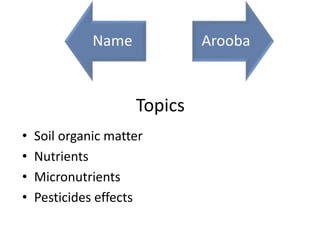Soil organic matter, Nutrients and Micronutrients, Pesticides effects
- 1. Topics ŌĆó Soil organic matter ŌĆó Nutrients ŌĆó Micronutrients ŌĆó Pesticides effects Name Arooba
- 2. Soil organic matter (SOM) ’üČOutline ŌĆó definition ŌĆó Composition of soil OM ŌĆó What does organic matter do in soil ŌĆó Significance of organic matter ŌĆó Effect on environment
- 3. Soil ŌĆóOutermost solid layer of the earth ŌĆóCollection of natural bodies ŌĆóMade up of organic materials ŌĆóThat support the growth of plants ŌĆóDifferent from substrate
- 4. Conti..
- 7. What does organic matter do in soil? ŌĆó OM is most important component of soil ŌĆó OM serve asŌĆ” ’ā╝reservoir of nutrients ’ā╝ water in soil ’ā╝Help in reducing compaction ’ā╝Reduce surface crusting ’ā╝Increases water infiltration into the soil
- 8. Benefits of OM ŌĆó Improve the soilŌĆÖs ability to take up and hold water ŌĆó Improve the soil structure ŌĆó work like a sponge that absorb up to 90 percent water ŌĆó release most of the water that is absorbs to water ŌĆó Release nutrients in soil that increases its fertality
- 9. OM provides
- 10. SOM
- 11. Nutrients ’ü▒ Outlines: ŌĆó Define term nutrients ŌĆó Tell what are nutrients? ŌĆó State balanced diet ŌĆó Types of nutrients ŌĆó Group nutrients
- 12. Nutrients ’āś chemical substance found in food ’āśWhich help the body work ’āśMaintain the body balance ’āśProvide nourishment for growth ’āśWe need 50 nutrients overall ’āśThat divided into six groups
- 13. Why you need nutrients? ’üČYour body need nutrients toŌĆ” ŌĆó Fuel your body ŌĆó Help you to grow ŌĆó Repair yourself ŌĆó Maintain basic bodily functions ŌĆó Such as metabolism, growth and sexcual functions etc.
- 16. Role Of 6 Major Nutrients ŌĆó Water (remove waste nutrients and regulate body temperature) ŌĆó Protein (build new tissues, antibodies, enzymes and hormones etc) ŌĆó Carbohydrate (provide energy) ŌĆó Fat (provide long term energy, insulation and protection) ŌĆó Vitamins (facilitate use of other nutrients, regulate growth and manufacturing hormones) ŌĆó Minerals (build bones and teeth, help in muscle functioning and nervous system activity)
- 18. Macronutrients And Micronutrients ’üČ Macronutrients 1) Nutrients that required in large amount 2) E.g Protein, fiber, water and carbohydrates 3) Cereals, legumes, meat, fish, yams, potatoes, nuts, oil and seeds are rich in macronutrients 4) Provide bulk energy needed for metabolic system ’üČ Micronutrients 1. Nutrients that require in small amount 2. E.g photo chemicals, antioxidants, vitamins and certain minerals 3. Vegetables, fruits, eggs, green, leafy vegetables etc. are rich in micronutrients 4. Help various functions of the body, growth and prevent diseases
- 19. Micronutrients ’ü▒ Outlines ŌĆó Definition ŌĆó Introduction ŌĆó Source ŌĆó Importance ŌĆó Deficiency effect
- 20. Definition ŌĆó Essential elements required by organisms ŌĆó In varying quantity ŌĆó To orchestrate a range of physiological functions ŌĆó And maintain health ŌĆó Their requirement differ between organisms ŌĆó E.g humans and other organisms require numerous vitamins and dietary minerals ŌĆó But plants require specific nutrients.
- 21. Role of micronutrients ŌĆó Micronutrients play a central role in metabolism and in maintenance of tissue functions ŌĆó Vitamins and minerals are basic micronutrients
- 23. Essential nutrients for plants ŌĆó 7 nutrients essential for plant growth and health ŌĆó Needed in small quantity but very necessary ŌĆó Boron (regulate metabolism, transport carbohydrate ) ŌĆó Chlorine (necessary for osmosis, photosynthesis) ŌĆó Copper (work like enzymes) ŌĆó Iron (essential for chlorophyll synthesis) ŌĆó Manganesa (activate enzymes) ŌĆó Molybdenum (essential for plant health) ŌĆó Zinc (activate enzyme, chlorophll formation)
- 24. Essential nutrients for humans ŌĆó Minerals and vitamins ŌĆó Require through out the life ŌĆó But in small quantity ŌĆó Nutrients (chromium, cobalt, copper, iodine, iron, manganesa, molybdenum, selenium, zinc) ŌĆó Vitamins (vitamin B complex B1, B2, B3, B5, B6, B7, B9,B12, A, C, D, K)
- 25. VITAMINS
- 26. MINERALS
- 27. TYPE OF VITAMINS ŌĆó Water soluble (vitamin B group) __ Dissolve easily in water __ and excreted from the body ŌĆó Fat soluble (A, D, E and K) __ absorbed through the intestinal tract __ with the help of lipids (fats)
- 28. Function of vitamins ŌĆó Acts as hormones ŌĆó Act as antioxidant ŌĆó Act as mediators ŌĆó Regulate cells and tissues growth ŌĆó Act as enzyme cofactor ŌĆó Act as a catalysts
- 29. Function of minerals ŌĆó Ca __ play role in formation of bones ŌĆó Mg__ act as cofactor of enzyme ŌĆó Fe__ transportation of oxygen ŌĆó K__ regulate heart beat ŌĆó Zn__ boost body immunity and heal wounds ŌĆó Cl __ produce acid in stomach ŌĆó I __ produce thyroid hormones ŌĆó P __ synthesis DNA and bones ŌĆó Na __ balance pH ŌĆó Cu __ metabolize iron and enzymes ŌĆó Se __ functioning antioxidant enzymes
- 30. Pesticides effects ’üČOutlines ŌĆó What are pesticides? ŌĆó Water pollution by pesticides ŌĆó Soil pollution by pesticides ŌĆó Air pollution by pesticides ŌĆó Resistance development



































